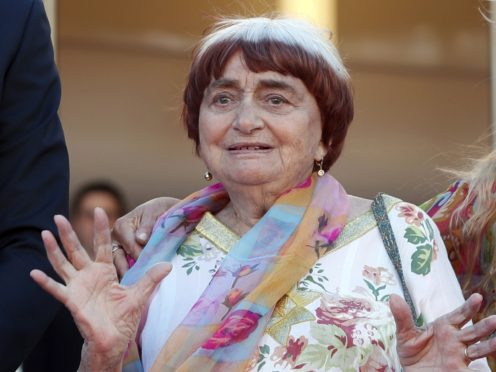Film-maker Agnes Varda, a central figure of the French New Wave and feminist activist who later won the Golden Lion at the Venice Film Festival, has died at the age of 90.
Her production company Cine Tamaris confirmed her death from cancer after French media reported the news.
Varda’s rich filmography includes movies such as Cleo From 5 to 7, Sans Toit Ni Loi — for which she won the Golden Lion in 1985 – Jacquot De Nantes and Les Glaneurs Et La Glaneuse.
Nicknamed the Grandmother of the New Wave, Varda was a fixture for years at the Cannes Film Festival, where she presented more than a dozen films from 1958 to 2018.
Immense sadness. For almost 65 years, Agnès Varda’s eyes and voice embodied cinema with endless inventiveness. The place she occupied is irreplaceable. Agnès loved images, words and people. She’s one of those whose youth will never fade. pic.twitter.com/cpquJXJtwK
— Festival de Cannes (@Festival_Cannes) March 29, 2019
She took part in two Cannes juries, and the festival gave her an honorary Palme d’Or in 2015 for her life’s work.
She was the first woman to receive such an honour, and regularly sought more recognition for women in the industry.
At last year’s Cannes festival, she joined jury president Cate Blanchett for a bilingual speech against sexual misconduct in the wake of the #MeToo movement.
“Women are not a minority in the world, and yet our industry says the opposite. The stairs of our industry must be accessible to all. Let’s climb,” she said.

The Cannes Festival tweeted that Varda’s death was a cause for “immense sadness”.
“For almost 65 years, Agnes Varda’s eyes and voice embodied cinema with endless inventiveness. The place she occupied is irreplaceable. Agnes loved images, words and people. She’s one of those whose youth will never fade,” the tweet continued.
With her distinctive half-red, half-grey hairstyle, Varda was instantly recognisable on the European film circuit, where she was often one of the few female directors in the crowd.
She was honoured last month at the Berlin Film Festival with the Berlinale Camera award for lifetime achievement. The festival had its highest number of women directors yet, some of whom named Varda as an inspiration.
Only a few weeks ago we had the honor to award her with the #BerlinaleCamera at #Berlinale2019. Today, we're deeply saddened by her loss: #AgnèsVarda, one of the most significant filmmakers of French cinema, passed away at the age of 90. https://t.co/28MvQ6PlpO© Gerhard Kassner pic.twitter.com/AmeZlnudtL
— Berlinale (@berlinale) March 29, 2019
Her 2017 documentary with street artist JR – Faces Places – was nominated for an Oscar, making Varda, then 89, the oldest woman ever nominated — and won best documentary at the Independent Film Spirit Awards.
“There is nothing to be proud of, but happy,” Varda said after the Oscar nomination. “I love my own work and I’ve done it for so many years, so I didn’t do it for honour or money. My films never made money.”
When she could not attend the Oscar nominees’ luncheon, JR took a life-sized cardboard cutout of her on to the red carpet with him.
Born in Brussels on May 30 1928, Varda started as a photographer after studying literature and arts. In 1951, she was appointed official photographer of the Theatre National Populaire, and remained in that position for the next decade.
In 1954, well before Jean-Luc Godard and Francois Truffaut became the emblematic figures of the New Wave, Varda’s first movie, La Pointe Courte, followed a couple going through a crisis in the small port of Sete on the Mediterranean coast.
She made several documentary shorts, but inadequate funds prevented Varda from making her next feature, Cleo From 5 to 7, until 1961. She came to prominence with that film, a real-time movie about a young woman who may have cancer.
Backed by French businessman Georges de Beauregard, who had supported Jean-Luc Godard’s Breathless, the film studied Cleo’s evolvolution from a shallow pop star to an authentic human being capable of understanding pain in herself and others.
Cleo was again praised by critics and was a commercial success as well, building anticipation for Happiness, which won the Silver Bear award at the 1965 Berlin Festival.
Varda continued to explore themes of illness and life as a couple later in her career. Her biggest success came in 1985 with Vagabond, starring Sandrine Bonnaire, who plays the tragic role of young marginal wandering to her death.
Thanks 🙏 @Ava @EvaLongoria @VictoriaMahoney and Kat Candler @MoMAFilm @Fond_Cartier @ARTEfr @KeringGroup @mk2 we are at the Berlinale today 💜🎥💃 thanks 🙏 to the crew and family and friends 🥰 pic.twitter.com/m7p1E6RzxL
— Rosalie Varda (@RosalieVarda) February 13, 2019
Varda was married to French director Jacques Demy, who died in 1990. She is survived by her two children, Mathieu Demy and Rosalie Varda, who are both involved in French film-making.
